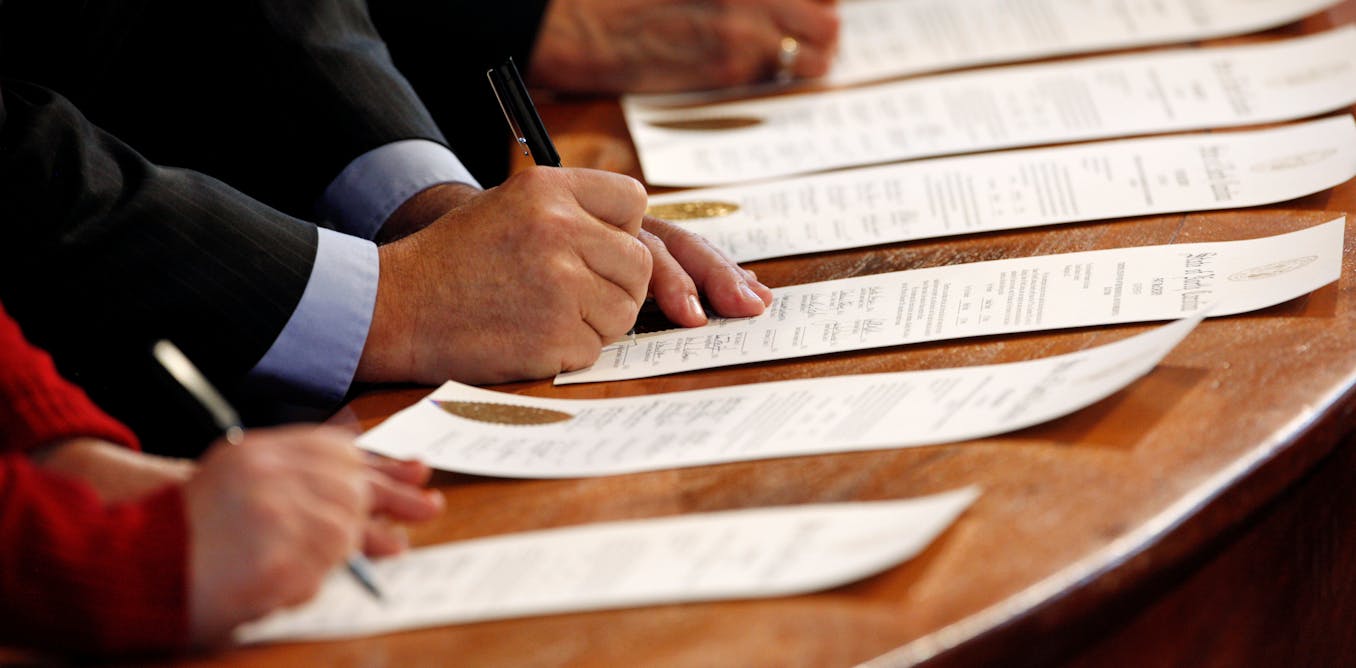
- Select a language for the TTS:
- UK English Female
- UK English Male
- US English Female
- US English Male
- Australian Female
- Australian Male
- Language selected: (auto detect) - EN
Play all audios:
With the presidential election looming, worried observers of politics have already asked whether the Electoral College will again deliver a victory to the candidate with less than a majority
of the popular vote. This has happened in two of the last five presidential elections. Critics like Vox’s Ezra Klein contend that this phenomenon is not only undemocratic, but also
politically biased, because Republicans were the beneficiaries of both of these Electoral College hiccups. “American politics is edging into an era of crisis,” Klein writes. But presidential
elections – and the occasional hiccups like 2000 and 2016 – represent nothing less than the smooth working of the constitutional system’s allocation of power among the states. I’ve studied
elections and governmental systems around the world. No matter how fairly one tries to allocate political power, some state or someone will have a special edge from time to time. It’s
unavoidable. But it’s not undemocratic. AMERICAN CONSTITUTIONAL MATH A state’s Electoral College votes are the sum total of its seats in the U.S. Senate and House of Representatives. The
Electoral College therefore rewards very small states. That’s because all states, regardless of their populations, are guaranteed equal representation in the Senate with two seats each, as
well as at least one seat in the House of Representatives. Seats in the House are allocated through a formula called the “method of equal proportions.” (If you are a math nerd, you will love
this formula.) The formula occasionally generates some peculiar results. For example, in 2010, Rhode Island (pop. 1,055,247) received two House seats. Montana (pop. 994,416) got only one
seat, even though its population was nearly double Wyoming’s (568,300) which also got one seat. This is typical of any mathematical formula. The results are logical, but not necessarily
appealing. In another year, with different populations, Montana might get that second seat and another state would cry “foul.” The Electoral College adds the Senate’s equal, but unfair,
allocation of seats to the peculiar, but logical, allocation of House seats. The result is that voters in small blue states like Rhode Island and small red states like Wyoming have much more
voting power per person in the House, Senate and Electoral College than their counterparts in, say, Texas, California or Montana. TWEAKING THE FORMULA To remedy some of the perceived
unfairness, advocates for reform have called for a change to a national popular vote system for presidential elections or, perhaps, a proportional allocation of Electoral College votes
within each state. Such reforms might generate seemingly fairer presidential election results in the short run. But there is no simple, consistent way to allocate legislative seats among
states of radically different sizes. If the U.S. were to increase the size of the House, admit Puerto Rico or Washington, D.C. to the union as states, or perhaps split California into three
states, the Electoral College debate would be rekindled, because each new state would be guaranteed three electoral votes. Regardless of the number of states or the formula used to allocate
legislative seats and Electoral College votes, some state will complain that it was shortchanged. In my view, this is the cost of operating as a nation that is composed of states, provinces
or other smaller groups. INTERNATIONAL COMPARISONS Other federal nations endure the same disparity of representation that favors smaller states. Canada has a similar disparity of voting
power between the larger provinces of Ontario and Quebec – which each has more than 100,000 people per member of Parliament – and smaller ones such as Nunavut or the Yukon, with barely
35,000 people per member of Parliament. Albertans have the least voting power per capita, with nearly 120,000 residents per member of Parliament. In Spain, too, power is unevenly allocated.
With nearly 180,000 people per representative in the Congress, people in Madrid and Barcelona have much less voting power per capita than the denizens of less-populated provinces such as
Soria. This demonstrates the complexity of organizing a democracy that ensures equality of individual voting power, but also allows smaller states or provinces to have a meaningful voice in
the legislative process and the election of presidents. In my view – and as federal nations around the world demonstrate – it is impossible to achieve both with perfection. As the U.S. heads
into the 2020 elections, I’d suggest that the public be wary of critics who call for “reforms” to the American electoral process but fail to put our process in a global perspective. They
are often calling for a result that they prefer – not necessarily a better process. [ _You’re smart and curious about the world. So are The Conversation’s authors and editors._ You can read
us daily by subscribing to our newsletter. ]








